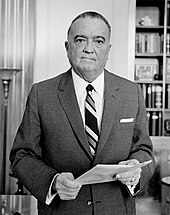COINTELPRO

COINTELPRO (fully: Counterintelligence Program ) was a secret program of the US Federal Police FBI that existed between 1956 and 1971. It included the systematic surveillance and disruption of politically active organizations and individuals that the FBI deemed subversive . The program became the subject of parliamentary scrutiny in the 1970s after it became public. With the Church Committee , a special committee of the US Senate later found that many of the techniques used by COINTELPRO were incompatible with the principles of a democratic society.
Action

The operations took place between 1956 and 1971 and were intended to discredit , monitor and wear down groups and individuals classified as politically dangerous . Communist parties ( KPUSA , Socialist Workers Party ) and the Ku Klux Klan as well as student organizations ( Students for a Democratic Society ) and the civil rights movement ( SCLC , NAACP , CORE ) were affected by the FBI's actions, some of which were illegal . The anti-war movement against the Vietnam War was also targeted , with some members of the US Senate coming into focus who had expressed themselves critically about the war.
The FBI used four main methods:
- Infiltration: Informers and agents not only spied on activists and organizations, but actively disrupted them.
- Psychological terror from the outside: By means of false accusations in the media, forged letters, anonymous denunciations, etc., attempts were made to destroy employment and personal relationships of certain people.
- Persecution : The FBI and local law enforcement agencies portrayed dissidents as criminals. Evidence was falsified and false statements were given in court to obtain arrests and convictions.
- Use of violence: Activists should also be intimidated or even switched off through violence . This ranged from mere threats of violence to break-ins and illegal searches to vandalism, thugs and even murder. So was Fred Hampton , a leader of the Black Panther , was shot dead by police in his sleep.
Among the most prominent victims of such methods were Martin Luther King and the Native American activists Dennis Banks and Leonard Peltier . The FBI's activities later became the subject of investigation by the Church Committee .
background
The project had its roots in a widespread anti-communist hysteria, see also Red Scare . Suspicions that left and radical organizations were manipulated by hostile secret services from abroad (especially by the KGB) and wanted to violently undermine the state order in the USA prompted the powerful FBI chief J. Edgar Hoover to institutionalize COINTELPRO. Historians later referred to this as the "Great American Inquisition " .
Around the same time, such groups of people were also monitored by the CIA's foreign intelligence service as part of Operation CHAOS , which was against the US Constitution.
Exposure
Activists of the civil rights movement had assumed by the mid-1960s at the latest that, contrary to the law, the FBI not only watched them but also pressured them. A group led by William C. Davidon , a physics professor at Haverford College , wanted to gather evidence of the illegal activities of the authorities. They planned to break into an FBI office trying to steal documents. After months of preparation, nine people broke into the FBI's branch office in Media on the night of March 8, 1971, and made the captured documents available to the press. The perpetrators remained undetected for 43 years and some then went public with the journalist Betty Medsger in January 2014 .
Movie
- All power to the people . Documentary 115 min by Lee Lew-Lee 1996, "All Power to the People" in the Internet Movie Database , the film online at topdocumentaryfilms.com
literature
- Ward Churchill , Jim Vander Wall: Agents of Repression. The FBI's Secret Wars Against the Black Panther Party and the American Indian Movement . South End Press, Cambridge / MA, USA 1988 and 2002
- Betty Medsger: The Burglary: The Discovery of J. Edgar Hoover's Secret FBI Alfred A. Knopf, 2014, ISBN 978-0307962959
Web links
- Compared to the Global Surveillance and Espionage Affair : PRISM: Like Something J. Edgar Hoover Would Have Imagined, Only Worse , Slate - Website, June 7, 2013. Retrieved January 12, 2014.
- COINTELPRO sources ( Memento from January 13, 2013 in the Internet Archive )
- COINTELPRO in the 70s from War at Home: Covert action against US activists and what we can do about it by Brian Glick , South End Press, July 1, 1999. ISBN 978-0896083493
- COINTELPRO Again? from the Public Broadcasting Service
Individual evidence
- ↑ COINTELPRO. Encyclopædia Britannica, accessed June 2, 2019 .
- ^ "Final report of the Select Committee to Study Governmental Operations with Respect to Intelligence Activities, United States Senate: together with additional, supplemental, and separate views." April 26, 1976, original quote: "the growth of intelligence abuses reflects a more general failure of our basic institutions."
- ↑ a b c Intelligence Activities and the Rights of Americans , Book II (final report of the Church Committee )
- ↑ a b Supplementary Detailed Staff Rerports on Intelligence Activities and the Rights of Americans , Book III (final report of the Church Committee)
- ↑ Glick, Brian (1989). War at Home: Covert Action Against US Activists and What We Can Do About It. South End Press. ISBN 978-0-89608-349-3 ( online excerpts from the chapter on COINTELPRO. )
- ↑ a b James C. Harrington: (In) dependent justice. The trial of Fethullah Güllen in the course of the democratization of Turkey. 1st edition. Main-Donau-Verlag, Frankfurt am Main 2012, ISBN 3-944206-05-3 .
- ↑ Center for Constitutional Rights: Racism, Repression, and Resistance: COINTELPRO Then and Now: 40 years since the FBI and Chicago police assassinated Fred Hampton ( English ) Center for Constitutional Rights . December 3, 2009. Retrieved June 20, 2013.
- ^ Athan G. Theoharis / John S. Cox: The Boss: J. Edgar Hoover and the Great American Inquisition. Temple University Press. 1988
